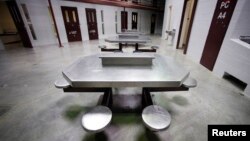LONDON —
More than 150 doctors have called for Guantanamo Bay detainees on a hunger strike to receive independent medical care.
The call for independent medical care was made in an open letter published in the British medical journal The Lancet on Wednesday.
“It is a general principle of medical ethics worldwide, as enforced by the World Medical Association and supported by the U.N., that it is an assault to force treatment on an unwilling but competent patient,” said Britain-based doctor Frank Arnold, one of those who signed the letter.
Among the166 detainees being held at Guantanamo, more than 100 are on a hunger strike, some for as long as five months.
Military officials said several dozen of the detainees have received "enteral feeding," in which liquid is administered by a tube that is inserted through the nose and down the throat.
Last month, 13 of the detainees wrote to a British newspaper, The Guardian, asking to see civilian doctors. They said the military doctors were force-feeding them against their will and said they did not trust them.
“These hunger strikers need doctors they can trust. They cannot trust doctors that are working from a script written for them by non-medics, who are the camp commanders and their superiors at the Pentagon,” said Arnold.
The detainees are protesting the U.S. government's failure to put terror suspects on trial and release the dozens of detainees who already have been cleared.
A Pentagon spokesman told VOA Wednesday the Defense Department does not answer letters addressed to government agencies via the press.
U.S. Navy Captain Robert Durand, a spokesman for the Guantanamo facility, said detainees are force-fed to prevent endangering their health. He said it is the job of supervisors at Guantanamo to make sure detainees are held in a safe and humane manner.
Douglas Murray, associate director at the Henry Jackson Society research group in London, said officials at Guantanamo Bay should be allowed to make the best decisions for the detainees without outside interference.
“As far as I am aware, and I think as far as any impartial observer is aware, there is more than adequate medical expertise available at Guantanamo Bay," said Murray. "It is a facility which passes, and indeed I think exceeds, the norms of most prison facilities.”
When U.S. President Barack Obama took office in 2009 he pledged to close Guantanamo, and recently has restated that goal.
The call for independent medical care was made in an open letter published in the British medical journal The Lancet on Wednesday.
“It is a general principle of medical ethics worldwide, as enforced by the World Medical Association and supported by the U.N., that it is an assault to force treatment on an unwilling but competent patient,” said Britain-based doctor Frank Arnold, one of those who signed the letter.
Among the166 detainees being held at Guantanamo, more than 100 are on a hunger strike, some for as long as five months.
Military officials said several dozen of the detainees have received "enteral feeding," in which liquid is administered by a tube that is inserted through the nose and down the throat.
Last month, 13 of the detainees wrote to a British newspaper, The Guardian, asking to see civilian doctors. They said the military doctors were force-feeding them against their will and said they did not trust them.
“These hunger strikers need doctors they can trust. They cannot trust doctors that are working from a script written for them by non-medics, who are the camp commanders and their superiors at the Pentagon,” said Arnold.
The detainees are protesting the U.S. government's failure to put terror suspects on trial and release the dozens of detainees who already have been cleared.
A Pentagon spokesman told VOA Wednesday the Defense Department does not answer letters addressed to government agencies via the press.
U.S. Navy Captain Robert Durand, a spokesman for the Guantanamo facility, said detainees are force-fed to prevent endangering their health. He said it is the job of supervisors at Guantanamo to make sure detainees are held in a safe and humane manner.
Douglas Murray, associate director at the Henry Jackson Society research group in London, said officials at Guantanamo Bay should be allowed to make the best decisions for the detainees without outside interference.
“As far as I am aware, and I think as far as any impartial observer is aware, there is more than adequate medical expertise available at Guantanamo Bay," said Murray. "It is a facility which passes, and indeed I think exceeds, the norms of most prison facilities.”
When U.S. President Barack Obama took office in 2009 he pledged to close Guantanamo, and recently has restated that goal.




